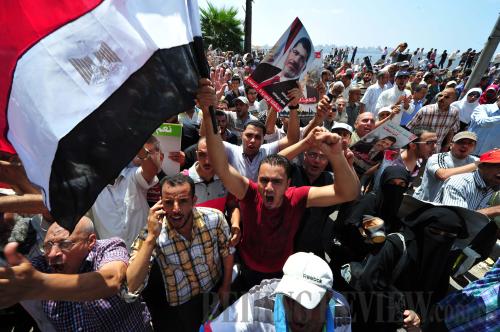|
 |
|
ANGER: Loyalists raise posters of ousted Egyptian President Mohamed Morsi and shout slogans during a march on August 16, in Alexandria, to protest the killing of his supporters following a security crackdown two days earlier (XINHUA/AFP) |

The situation in Egypt has escalated to an alarming degree. With nearly 900 supporters of ousted President Mohamed Morsi killed and some 5,000 injured since the Egyptian army forcibly cleared a protest camp by the Muslim Brotherhood (MB) in Cairo during mid-August, the risk of spiraling violent confrontations or even civil war has spiked sharply. Presently, finding a way out of the current chaos has become the nation's most urgent task.
A danger of civil war
Since the overthrow of Egypt's ex-President Hosni Mubarak in January 2011, a fierce power struggle between the MB and Egyptian secularists has caused continuous unrest in the country. After MB won power through elections, Islamic political forces sought to dominate Egypt's political process, further intensifying the existing conflict between MB and both the secularists and Egyptian military.
When the military dismissed Morsi in July, Egypt's political crisis erupted again. The contradiction between parties then devolved into violent conflicts. So far, there are no signs of political reconciliation as Egyptian society is tearing apart at the seams. The Egyptian transitional government asserted it would fight resolutely against extremism and terrorism. Thus far, more than 100 top MB members have been detained. Meanwhile, the Anti-Coup Alliance, led by the MB, has called for continuous peaceful protests demanding the return of Morsi. In addition, the conflicts between Sunnite and Shia, extreme Islamists and Christians within Egyptian society are also on the rise. Since mid-August, dozens of Christian churches, schools and enterprises have been attacked.
The violence now gripping the country could possibly result in civil war. As the largest Islamist group in Egypt, the MB has an 85-year history. It is well organized and enjoys a broad basis of popular support. After the overthrow of Mubarak, the strength of the MB was further enhanced. Furthermore, it has a long history of government resistance. Therefore, it is hard for the Egyptian military to fully tame the organization. It is noteworthy that the tough actions of the Egyptian military could possibly lead to a split between the moderate and radical wings of the MB, with the latter launching a fierce fight against the military. Moreover, terrorist groups including Al Qaeda have taken advantage of the Egyptian chaos by launching attacks on the Sinai Peninsula and other districts, further deteriorating the situation on the ground. There are widespread fears within the international community that civil war could erupt in Egypt.
Civil unrest in Egypt, a leading player in the region, will unavoidably affect the country's foreign relations as well as regional security and stability. The consequences of the civil unrest may even exceed that of the Syrian civil war. First, Egypt's political unrest will impact the settlements of three hot regional issues—respectively the Palestinian-Israeli conflict, Syrian civil war and the Iranian nuclear issue. Second, terrorist groups may take the opportunity to launch attacks and foment chaos. And third, the conflicts between Egyptian secularists and Islamists as well as military intervention in civil politics could set a bad example for regional countries.
The military's role
For the moment, although Egypt's military can generally maintain control of the political situation, it cannot address the political crisis single-handedly in the long run. The country's short-term outlook is not optimistic. Since late Egyptian President Gamal Abdel Nasser led the 1952 Revolution, the military has played a significant role in Egypt's political and social life. All former Egyptian presidents including Nasser, Anwar Sadat and Mubarak came from military backgrounds. The military also sees itself as the defender of national security and secular democracy in Egypt.
The overthrow of Morsi has gained the military a certain amount of support and praise from the Egyptian public. But it has also created enormous challenges. The MB still cannot be tamed, posing a serious threat to future stability. The bloody incident during the site-clearing in Cairo has resulted in the internal division of the interim government along with the resignation of interim Vice President Mohamed El-Baradei.
In the new era, it is hard for the Egyptian military to attend to state affairs from behind the scenes. But at present, no political forces—including the military—have a solution to the current crisis. If turmoil and conflict continue amid a deteriorating economy, it cannot be ruled out that the military could become the next target of Egyptian public opposition. Meanwhile, military intervention into civil politics has also aroused criticism from the international community. Egypt is faced with isolation and the threat of losing its aid from the outside world.
Egypt cannot emerge from political turmoil anytime soon. Political and social unrest are sure to accompany its future development. Since the Middle East upheaval in 2011, Egypt and most other regional Arabic countries have been mired in ideological chaos. The lack of mature democratic regimes and national consensus as well as disordered social management systems have resulted in long-term social disturbance and political chaos. At the same time, as the influence of the United States, which has been dominating in Middle East affairs since World War II, is declining in the region, the outside world can do little to contribute to the stability of Egypt's political situation.
The country's most pressing task is to attain national stability and restore social order, while avoiding escalation of the conflict. Though it will not be easy to achieve, Egyptian authorities and opposition should make efforts in the following aspects: First, all parties concerned should put aside ideological differences, stress national interests and promote reconciliation. All sides should avoid taking action unilaterally that might deteriorate the current situation. Second, Egypt's current authority should hold general elections as soon as possible in order to reach out to all political forces, including moderate Islamists, and establish an inclusive and pluralist political system and legal institutions. Third, all political forces should refocus on developing the economy, improving people's livelihood and realizing social justice. No stability could be achieved without economic development and livelihood improvement. And lastly, the outside world should try to help promote national reconciliation and ease tensions in Egypt while not interfering in the country's domestic affairs based on their own interests. Merely supporting one side while objecting to the other based on such interest would worsen the situation rather than facilitate peaceful resolution of Egypt's political crises.
The author is Director of Middle East Studies at the Institute of West Asian and African Studies under the Chinese Academy of Social Sciences
Email us at: liuyunyun@bjreview.com |
